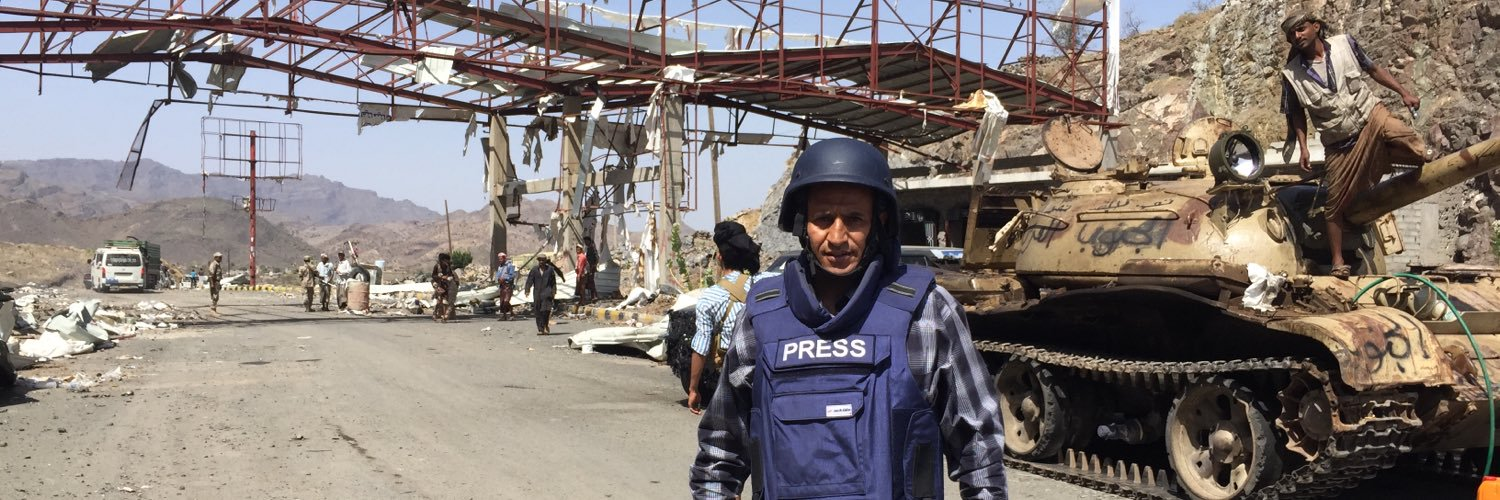Mohammed al-Qadhi: A Living Testimony from the Frontlines of the Yemen War and the Game of International Influence
English - Wednesday 20 August 2025 الساعة 11:12 am Aden, Newsyemen, Exclusive:
Aden, Newsyemen, Exclusive:
The experience of prominent Yemeni journalist Mohammed al-Qadhi represents a rare model of professional courage in an environment defined by constant danger, political complexity, and humanitarian tragedy. Since the outbreak of the Yemeni war in 2015, al-Qadhi has remained a direct witness to one of the worst humanitarian disasters of modern times, risking his life to deliver an accurate picture to the world about the suffering of civilians amid siege, bombardment, and the collapse of infrastructure.
During an interview with Canadian journalist Robert Frank, former New York Times correspondent in Canada and a journalist at the Canadian Broadcasting Corporation, al-Qadhi offered a snapshot of an arduous and perilous professional journey. He also shed light on the regional and international dimensions now surrounding the conflict, and the international community’s failure to grasp the essence of the crisis and address it.
Al-Qadhi, who worked as a correspondent for Sky News Arabia in Yemen, highlighted several key themes in his remarks: his personal and professional experience in covering the war, including the enormous dangers he faced; the tragic humanitarian consequences of siege and conflict on civilians, especially in the city of Taiz; the current situation in Yemen, where internal crises intertwine with regional and international interventions; and finally, his call for a redefined international approach to Yemen that is both strategic and humanitarian.
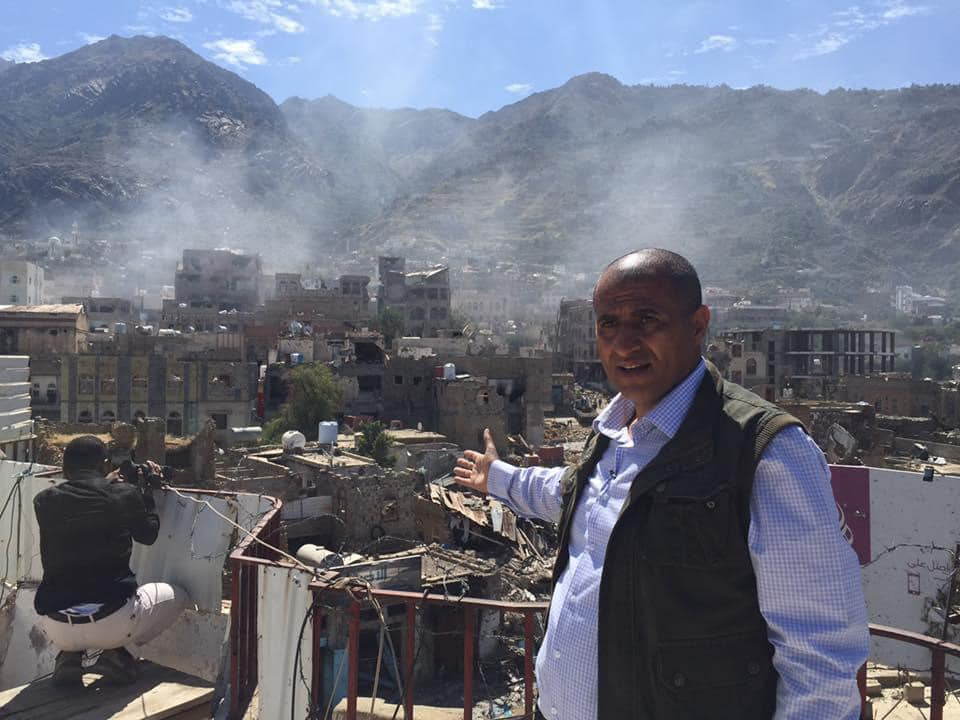
War Coverage and Field Experience
Al-Qadhi’s entry into war reporting in Yemen was not a coincidence, but an extension of years of journalistic work in a conflict-ridden environment. Since the early 2000s, he covered the wars between the Yemeni government and the Houthi movement in Saada (2004–2010). This period gave him a deep understanding of the dynamics of armed conflict in the country and trained him to navigate the dangers of field reporting.
But the peak of his mission came with the outbreak of the all-out war in 2015, when the Houthis—backed politically and militarily by Iran—seized the capital Sana’a and ousted the internationally recognized government. This prompted the Saudi-led Arab coalition to intervene militarily and launch a massive air campaign against the Houthis. At this moment, al-Qadhi found himself with an extraordinary mission: to cover a full-scale war where local and regional dimensions overlapped.
For more than five consecutive years, his work went far beyond monitoring official statements or political speeches. He lived the experience on the frontlines, moving between battlefronts and besieged areas, particularly the city of Taiz, one of the most tragic epicenters of the conflict. There, he documented daily the humanitarian collapse: food shortages, lack of medicine, destroyed infrastructure, and the suffering of civilians under shelling and siege.
These five years came at a heavy price. Al-Qadhi was kidnapped, injured in a way that almost cost him an eye, and survived death on multiple occasions. He also endured repeated death threats, harassment, and psychological strain. Yet he continued his work, driven by a firm belief that telling the truth is both a professional and moral duty, and that exposing the scale of the tragedy could help save lives or stir the conscience of the international community.
His journalistic mission became akin to a personal battle: a battle against fear, against attempts to silence an independent voice, and against the despair caused by a war with no horizon for peace.
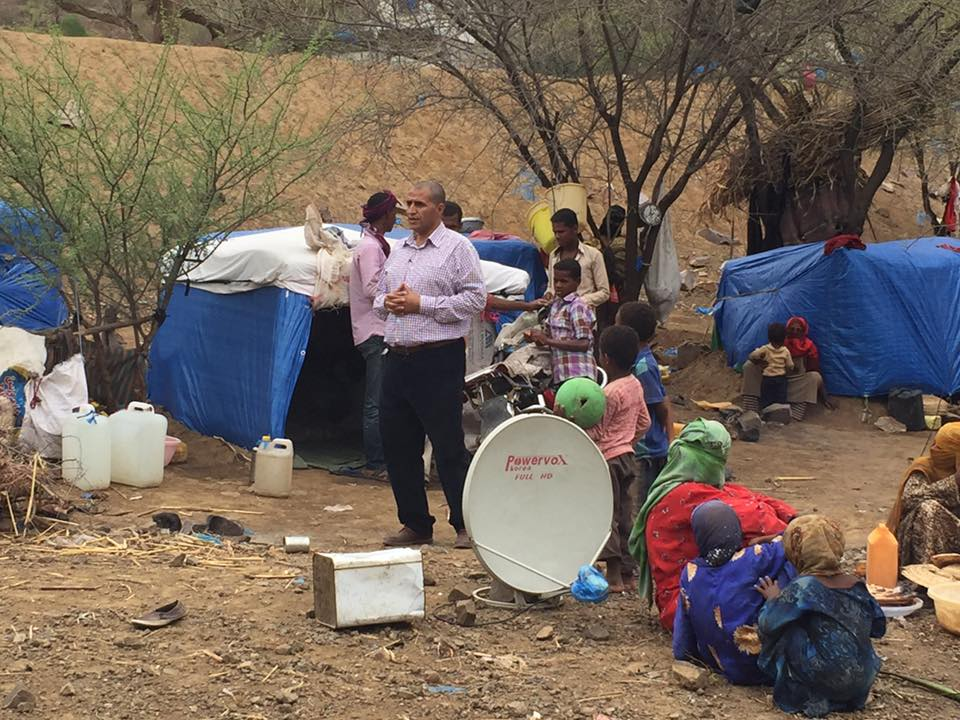
The Humanitarian Dimension of the Crisis
Al-Qadhi’s reports were not limited to military or political developments. They focused on the most painful dimension of the Yemeni tragedy: the humanitarian catastrophe endured by civilians, especially in Taiz, which remained under a suffocating siege by the Houthis for years. There, documenting daily life became a form of rescue work. Al-Qadhi was determined to show the world the harsh reality of food shortages, lack of medicine, and near-total collapse of basic services.
In his field reports, he did not stop at numbers and statistics. He described in detail the families waiting in long lines for a handful of flour, hospitals operating with worn-out equipment and almost no resources, and children suffering from malnutrition and preventable diseases. Even basic needs, such as ice to preserve medicine or milk for infants, disappeared from the markets, making daily survival a grueling test of resilience.
His reporting had tangible results. Al-Qadhi recounted how some hospitals received urgent aid after their plight was highlighted in his reports, saving the lives of kidney dialysis patients and others suffering from chronic, life-threatening diseases. This positive response from donors and aid organizations confirmed that words and images can sometimes be more powerful than bullets in saving lives.
But this close engagement with tragedy came at a personal cost. Al-Qadhi bore immense psychological and physical scars. He suffered trauma from scenes of destruction and death, and endured deep personal pain when his mother passed away during the war. Because of the siege and the danger of travel, he was unable to attend her funeral. This absence left an indelible mark on him, transforming his reporting into more than journalism—an act of human commitment toward his country and people.
He said: “I would go to hospitals and report their problems. The next day, immediate support would arrive, and many lives were saved. This humanitarian aspect was my main driver despite the psychological trauma and personal losses, especially after my mother’s death and my inability to attend her funeral.”
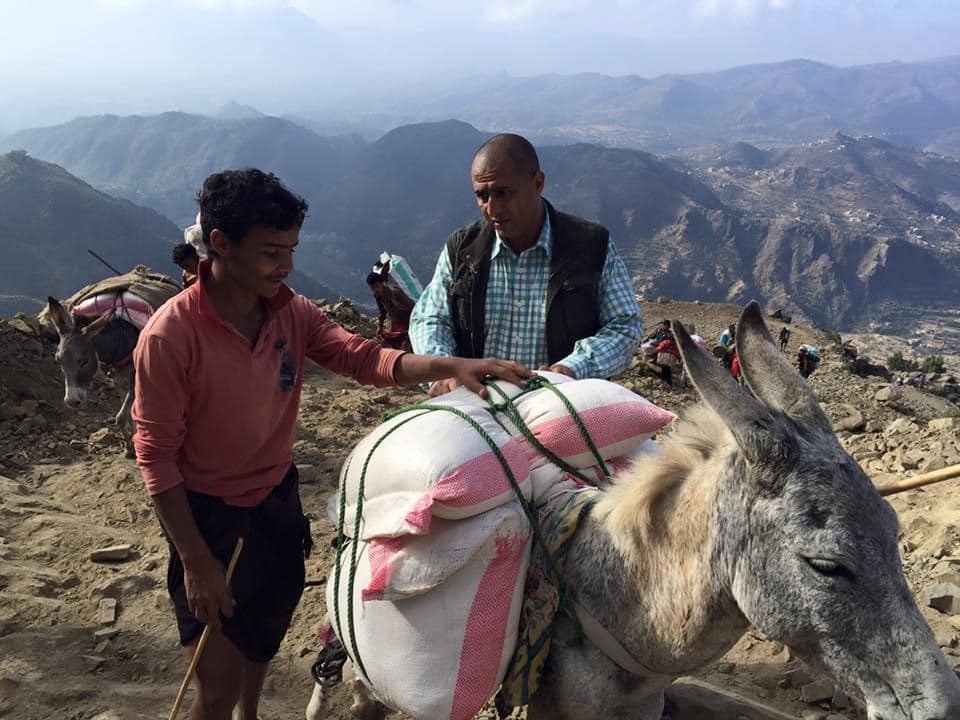
The Current Situation in Yemen
Al-Qadhi describes today’s Yemen as being trapped in a state of “no war, no peace”—a situation freezing the country in conflict without resolution or stability. Yemen remains politically and administratively divided between two rival authorities, each with its own flaws and challenges.
“In the north, the Houthis impose total control under an authoritarian security system, restricting freedoms and dominating state institutions and resources, while tightening their grip on society. Daily life there is dictated by surveillance and political repression. In the south and government-held areas, the opposite prevails: insecurity and fragmented power. Armed groups proliferate, state institutions are weakened, and the economy is in deep crisis, crippling the government’s ability to provide services or stabilize living conditions.”
He explained that the economic collapse is one of the gravest aspects of the current crisis. The national currency has lost much of its value, leading to soaring prices of basic goods and shrinking purchasing power. With scarce resources and limited job opportunities, poverty and hunger rates are rising, and millions of families now depend on humanitarian aid.
Al-Qadhi stressed that the Yemeni conflict long ago ceased to be a purely local affair. Recent developments have made its international dimension more acute. Houthi attacks on ships in the Red Sea have not only threatened international navigation and global trade security, but also directly linked the Yemeni crisis to global maritime security. The Houthis’ involvement in the Gaza war added a political and ideological layer, tying Yemen into the broader web of conflicts between Iran and its allies on one side, and the U.S., Israel, and their partners on the other.
“Everyone felt the pain when the Houthis started targeting ships in the Red Sea. Yemen is no longer just a local issue—it now directly impacts global trade and maritime security.”
These regional and international entanglements have turned Yemen into an open battleground, where local calculations are overtaken by a bigger game of influence in the Middle East. In the absence of an effective peace process and as the situation grows ever more complicated, the country’s future remains uncertain, and ordinary Yemenis are the biggest losers—caught between endless war and worsening economic and humanitarian siege.
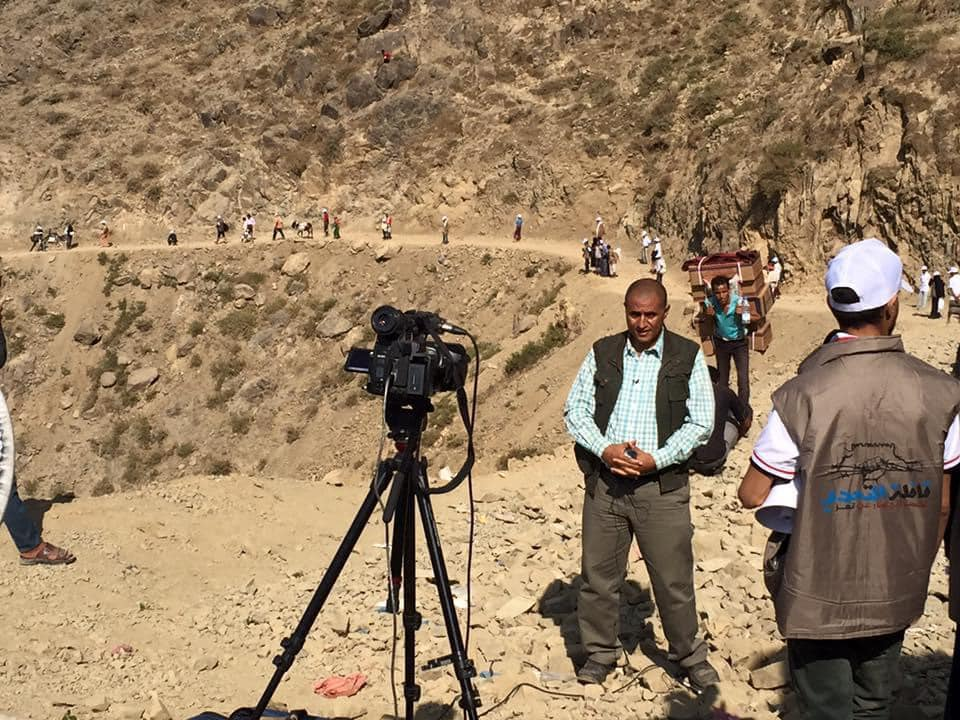
Criticism of the International Community
Al-Qadhi expressed clear frustration with how the international community—especially the U.S. and Western powers—has handled Yemen over the past decades. In his view, Western perspectives have been simplistic and reductive, treating Yemen as nothing more than “a Saudi problem” or a potential threat to oil supplies, while ignoring its independent strategic importance as a nation with a complex history and highly sensitive geopolitical position.
He stressed that Yemen’s location at the Bab al-Mandab Strait, one of the world’s most vital maritime chokepoints, makes it a central player in energy security and global trade. Nearly 30% of global oil supplies pass through the strait on their way to Europe and Asia. Yet this reality has received scant attention from Western policymakers, who preferred to view Yemen through the lens of Saudi interests or Gulf power balances rather than as an independent factor in regional and international security.
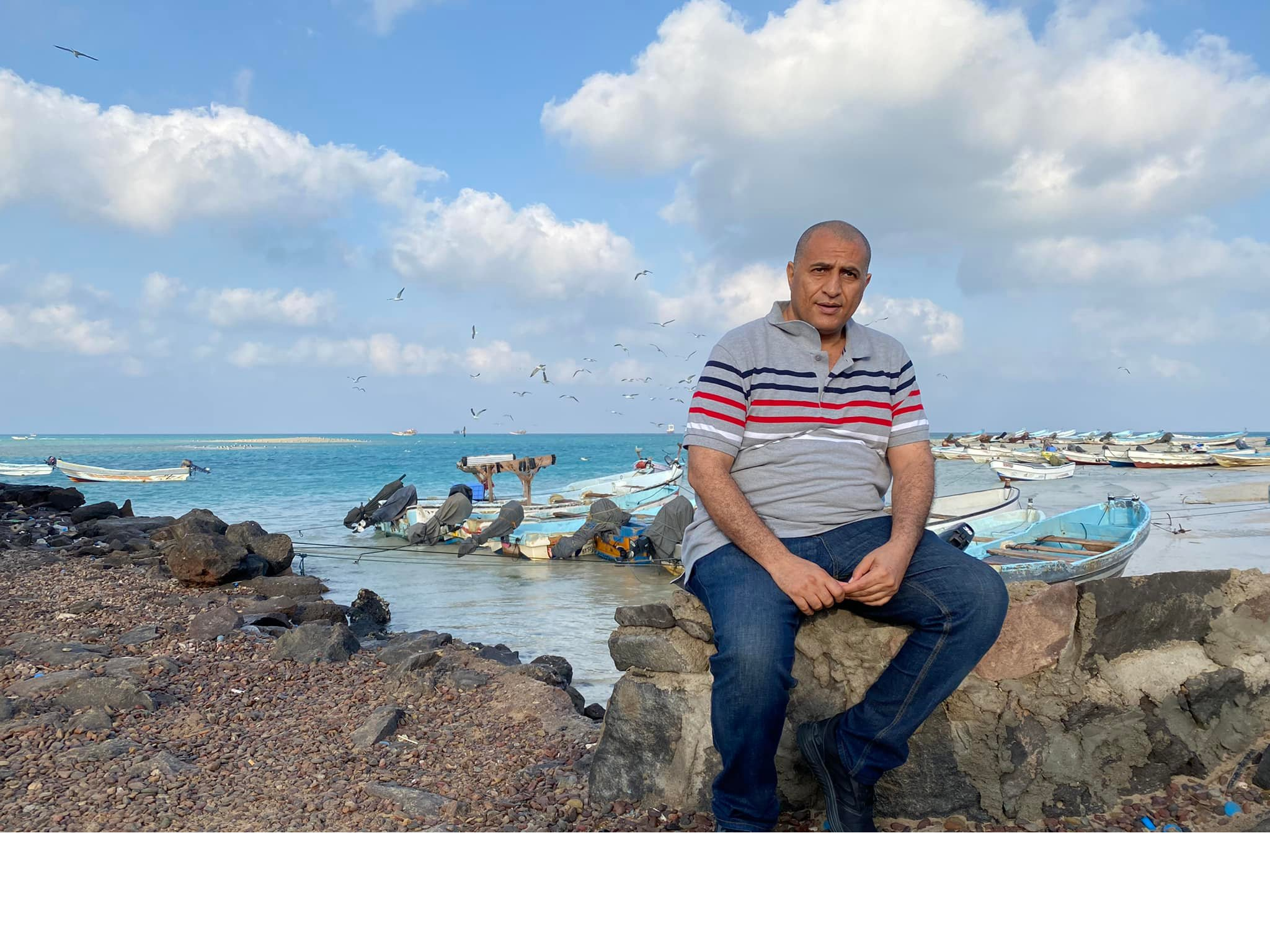
Real international attention, he argued, only came when Houthi attacks on commercial vessels in the Red Sea disrupted global shipping, raised insurance and freight costs, and forced ships onto longer, more expensive routes around the Cape of Good Hope. Only then did the West feel the “pain of the crisis,” when its direct economic interests were threatened, while the suffering of millions of Yemenis had long been met with near-total silence.
Given this, al-Qadhi urged a fundamental rethinking of the international approach to Yemen, one that moves beyond reactive measures or stopgap solutions—“like putting out a fire without addressing its roots.” He emphasized the need for a comprehensive approach based on a deep understanding of the conflict’s causes, addressing its structural roots, and building a sustainable peace process that prioritizes Yemeni interests, rather than quick fixes that reproduce the conflict in even more dangerous forms.
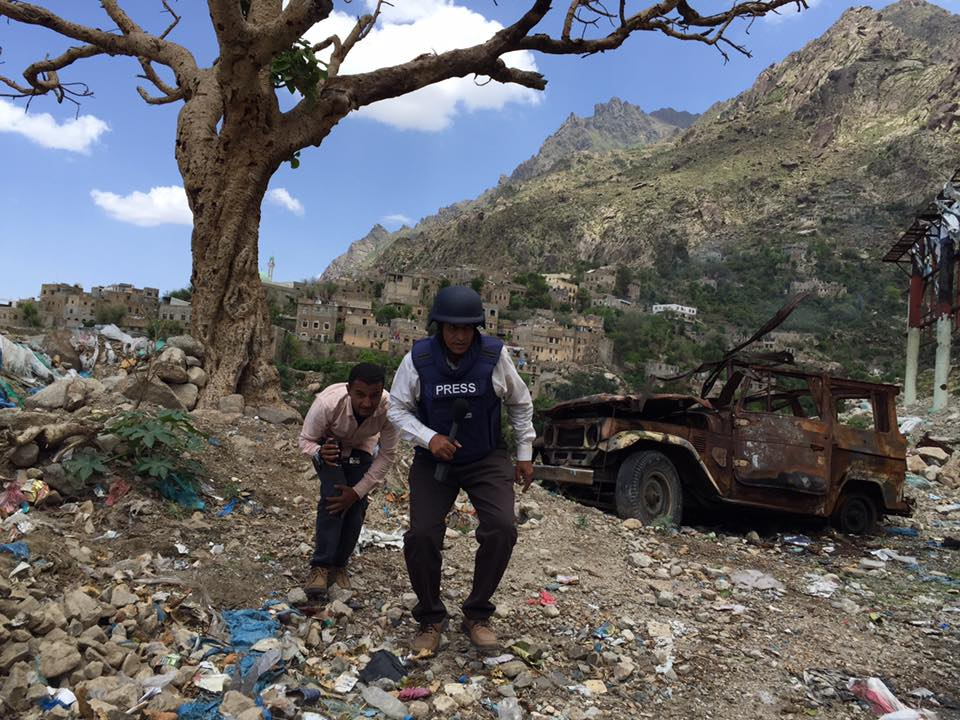
A Harsh Picture
Al-Qadhi’s testimony reflects the brutal reality of frontline journalism in a war zone, where reporting becomes a daily test of survival. His story shows that conveying the truth from the heart of battle is not only dangerous, but also an ongoing struggle that costs journalists their safety, mental health, and family lives. The injuries, threats, and personal losses he endured make his story a mirror of thousands of journalists in conflict zones—though with one crucial difference: these sacrifices are not made for fame or gain, but to reveal the suffering of a people trapped between war and hunger.
His field testimony also underscores that the Yemeni crisis has long transcended its local scope. What began as a domestic power struggle has become a complex geopolitical knot, where regional and global interests converge, with implications for maritime security, global trade, and even the prices of goods and energy in faraway markets like Europe and North America.
From this perspective, the key message al-Qadhi conveys is that ignoring Yemen is no longer an option. Its consequences are no longer confined within its borders. Addressing the crisis requires a dual vision: humanitarian, to respond to the urgent needs of millions of civilians facing famine and service collapse; and strategic, to recognize Yemen’s importance as a vital chokepoint in regional and global security.
He warns that continued neglect of Yemen as a “secondary file” or a mere security issue for one or two states will only exacerbate the conflict, turning it into an even broader threat to the entire world. Ending the suffering of millions and calming this hotspot is not only a matter of humanitarian solidarity, but also a strategic necessity for regional stability and to prevent even greater global economic and security crises in the future.
